- Home
- Peter Lerangis
The Orphan Page 2
The Orphan Read online
Page 2
A voice boomed out from inside the garden. “What are you doing, fool? You call yourself a guardian of the gate? There is a pomegranate missing!” Running at full speed, I disappeared into the throng.
Soon I could hear at least three, maybe four guards behind me. But I had the advantage in the streets. They were my home. I sprinted down the road away from the gardens, through the ceremonial gate, and into the city. I raced past lavish houses I could never dream of entering. Many people were sympathetic to a vulnerable, running child, but others shouted my whereabouts to the guards. I darted into the vast outdoor market, hoping to lose them among the vendors. My eyes darted from stall to stall, looking for anything I could use to my advantage.
I tried to avoid looking at the gaunt, screaming man in the wooden stocks in the center of the market. His wrists and ankles were nearly worn through to the bone, bound by metal clamps. His face was bloodied and swollen. He had been there for five days, left to die because he had not bowed sufficiently to the king. My stomach wrenched at the sight, but there was nothing I could do. I had Frada to save.
I escaped out the opposite side of the market, into the streets. But the streets had guards, too. To “keep the peace,” as the king labeled it. As they heard the shouts of my pursuers, they came after me, too. “Capture the street rat! It stole the king’s property!”
My three pursuers became four, then eight. It, they called me. As if I were a thing, not a person. That notion just made me run faster.
I headed toward an alley, but one of them had gotten there first. I darted back into the street but I’d lost time. Now another set of guards was emerging from the road ahead. They were behind me and in front of me.
I stopped. There was only one way to go now.
Up.
Grabbing the window frame of the nearest shop, I hoisted myself onto a balcony. The wall was cracked and full of metal hooks left over from old signs. I used them as handholds to climb up the wall.
“Careful, Daria!” a voice shouted. “They are close behind!”
It was another urchin, a girl I knew only as Shirath, who people called the sad-faced one. “Can you help me?” I shouted.
The girl didn’t answer, but I knew the look in her eyes. In their expression I could read a kind of silent code shared only by street people: I have your back.
The guards followed, but they were slow and clumsy, weighted down by armor. I climbed to the roof and glanced in either direction. The shops were connected, so I could make it from building to building, easily jumping the difference in heights. This—this!—was the fastest way to move through the city. The breeze flowed freely through my thin tunic. With nothing but the distant towers and ziggurats in my line of sight, I felt swift and free.
“Halt or I will shoot!” a voice thundered behind me.
I turned. One of the guards had reached the roof and was aiming an arrow at my head. I knew in that moment that he really meant Halt so I CAN shoot.
So I shot first. With my sling.
I caught him square between the eyes. He let out a cry, arched backward, and fell. I cringed as I saw his body drop through the space between buildings—and land with a sickening splat into a pile of sheep manure.
He would live. But he wouldn’t be bothering me.
With an effortful groan, another guard clambered onto the roof. I reached into my belt pouch to take out another stone.
I found nothing. I’d used the last one I had. Dropping the sling back into the pouch, I turned and ran across the roofs, leaping from building to building.
The guard was laughing. Taunting me. “The lion gets the rat!” he shouted.
I knew if he didn’t catch me, he’d shoot me in the back. On an instinct, I darted left, across another row of rooftops with patched tiles and cracked surfaces—a poorer neighborhood.
A neighborhood I knew well. Very well.
As a small child, I’d lived in an old, abandoned place close to the city wall. I needed to get to it. Now. It was my only hope. It would save me.
I felt an arrow whoosh past my ear as I jumped from a higher building down onto the old shelter’s roof. I landed near the wall shared by the two buildings. Carefully I walked sideways across the roof’s edge. It was the last building on the block. If I jumped, I would be seriously hurt.
The guard appeared at the ledge above me. His chest heaved with the effort. When he saw I was trapped, he grinned.
“Nowhere to run now, thief,” he said, leaping down toward the roof.
It was a strong leap. It launched him far forward. In midair, he drew his sword with a dramatic flourish. He landed with a loud thump, in the center of the roof.
I sidled farther along, my eyes on his feet. I knew that section of the roof well. It was rotted and patched with clay and netting. Unless, of course, it had been repaired.
“Please,” I said. “You must hear me out! You’re a father, are you not? Haven’t you ever had a sick child?”
“You dare compare yourself to a child of a royal guard?” he replied, charging toward me. “Prepare to meet your maker, street raaaaaa—”
Just like that, he was gone.
Through the roof.
His shocked scream echoed upward as he fell down two stories of rotted wood onto the earthen floor below. Getting as close as I safely could, I peered through the hole into a silent, rising cloud of thick dust.
From far away came a muffled sound of commotion. I looked into the street. It was empty. The guards had taken another turn. In the confusion, they’d somehow been drawn off course. Unless . . .
Shirath. She must have done something to confuse them. Pointed the guards into another alley, perhaps, or sent them into a different quadrant. This was her way. I knew it in my soul. This was how we protected each other. In the absence of power, you had to use brains.
With no one chasing me now, I could lower myself over the edge of the wall, grabbing onto holes and window ledges. I landed quietly in a dark alley.
Alone at last. My chest burned. My body cramped. I stood with my back against the wall, trying to calm myself down. I’d eluded the guards for now, but I had to keep moving, just to be sure. Commotion had a way of shifting. Guards had a way of finding their prey.
As I rushed through the dark alley, I twisted my tunic until one arm and shoulder were bare and hung out through the same hole as my neck and head. It was a small adjustment, but it changed my silhouette. I spotted an old basket on the ground and picked it up as I passed by. Finally I wrapped the gray shawl back around my head, tucking my hair carefully inside.
By the time I walked into the sunlight, I looked nothing like the thief who had been fleeing over the rooftops.
I hummed as I made my way through the streets, trying to ignore the thumping of my heart.
The shops became more and more run-down as I walked, the lanes grimier. After a while, I was hit with the familiar smell of sewage. I breathed deeply and smiled. My worry fell away.
I was in the slums.
I took one last look over my shoulder before disappearing into an alleyway between two sturdy buildings. Near a dead-end, I turned into the area behind the buildings and came to the door I was looking for. I knocked softly.
A small voice came from inside, that of a boy pretending to be much older than he actually was. “Go away. We are not accepting deliveries today.”
Nico.
“It’s me,” I said.
When I heard a click from the other side, I pushed the door in. Startled, Nico stumbled backward. The sight of his gangly body, his shocked face with its shadow of a mustache someday to be, made me laugh aloud. Despite bright sunlight outside, the room was silent and dark, lit only by two small lamps, a place that held secrets. I closed and latched the door in a single motion, then collapsed against it, letting out a long breath.
Home at last.
CHAPTER FIVE
ZAKITI’S MIRACLE POTION Purveyors was a poor excuse for a wine shop, which sold a worse excuse for wine. T
he old lady who owned it had no access to vineyards, and thus no grapes. To earn our shelter, Nico, Frada, and I had to gather weeds and discarded fruit, which Zakiti somehow fermented into a potion so foul and stinking that it was a wonder anyone could stand it. But people did. At least enough to keep the small shop going.
We had no windows, only a few oil lamps to light the shop. Our beds were rarely twice in the same place. We moved them as needed, finding space among the barrels and equipment in the crowded room.
Nico leaned against a dusty brick wall to my left. His eyes were deep and nearly black—always shifting, always calculating, always knowing something before you knew it. He wore a tunic made from a coarse brown sack that had once held lentils, and cinched with a rope. “Shirath told them you had sneaked to the northern quadrant,” he said. “She saved your life.”
“You knew?” I asked, astonished.
“Of course,” he said. “And there had to be a reason the guards were after you, yes? So I also know what you must have in your pouch. Assuming this is true—because I have the best instincts in the city—I bow to you in awe.”
Honestly, Nico could wear me out telling me how good, smart, and talented he is. “How is she?” I asked, moving toward a pallet of old sacks and blankets in one corner of the room.
Frada lay there limply. Her eyes were shut, her face skeletal, her mouse-brown hair a damp mess around her face
“Sleeping,” Nico replied, “but hot to the touch.”
I knelt closer to my good friend. Frada the Wise, Frada the Artist. She was unconscious but held a shard of charcoal in one hand. On the floor beside her was the side of a wooden crate, long ago broken off, which she liked to use as a drawing surface. On it was a half-finished drawing of three figures. Nico, Frada, Daria.
Frada liked to call us siblings. And who knew, maybe we were related. We knew nothing of where we came from. Ten years ago, someone had found us on the edge of Sippar, the black, roiling, moving wall of death that had come to surround the city. Foundlings, they called us. There was no place for us. Half the citizens of the city wouldn’t even touch us, because we’d been so close to the deadly borders, as if that closeness were some kind of disease. And they were scared by the strange, white, angled mark on the back of my head.
So we got by on our own. And we would stick by one another always.
“Here, Frada,” I said, eagerly pulling the pomegranate from my pouch. “Your troubles will be over.”
Nico’s eyes went wide at the sight of the fruit. “It’s true! Frada, wake up! Look! The pomegranate!”
“Shsshhh, you want the entire neighborhood to know what I’ve got?” I said. “I’ve been chased by idiot guards through half the city. Find us a bowl and a knife so I can get this fruit open.”
As Nico scurried off, Frada’s head turned. She let out a stream of coughs. I held the pomegranate up to the light so she could see it. Her hazel eyes grew wide, glistening in the lamplight.
“What’s going on back here?” shouted a voice like a scraping of a knife against stone. “I swear, if you’ve knocked over another cask I’ll throw you into the street this time!”
Zakiti could have been anywhere from thirty to a hundred. Her head was patched with matted clumps of brownish-gray hair, like a sun-scorched field. One of her eyes was dead, a milky sheen that stared into space. Years ago Zakiti had had a home, a good business, and fine looks. But on a visit to the Royal Garden she had been attacked by an escaped vizzeet, one of the monkey-like creatures whose foul spit can burn through skin. Banished into the street by a king who does not tolerate unsightliness, she came to be among those forced to keep their faces hidden in darkness.
Selling wine that was not really wine, Zakiti had grown used to a life of half-truths and outright lies. She could be kind or cruel. As long as we were quiet and did our work, we knew we had a roof over our heads.
I hid the pomegranate behind me. If Zakiti got mad, we’d be back on the streets.
“What do you have there, Daria?” The old lady hobbled into the storeroom, staring at us suspiciously with her one good eye. As she walked, tiny metal baubles jingled in her hair. Her clothes were threadbare and colorless.
I eyed Nico, who was skulking in the shadows, still looking for the bowl and knife. “Food,” I said, head down. “For Frada.”
Zakiti whipped her arm toward me, pulling at my elbow. “A pomegranate?” she whispered, her eye widening in astonishment. “Not from the King’s Grove?”
“I—I can explain,” I stammered.
She snatched the fruit away from me. As I looked on in horror, she pressed her fingers into the peel ever so slightly. “Why did you steal it?” Zakiti demanded. “Do you think this will bring you riches and status? Make you nobles? Take you away from me and make my life even more miserable?”
Frada let out a round of wracking coughs. A small trail of blood trickled down her cheek. She was dying before our eyes!
“It’s not for us, Zakiti!” Nico said.
“Lady Zakiti!” the old crone spat.
“Lady Zakiti,” I repeated. “Please. I took this for Frada. To bring her back to life. The pomegranate is said to cure ills.”
“Oh . . . ?” Zakiti eyed me suspiciously.
“So you see—if she is well, you will again have three healthy workers,” Nico added quickly, “not two!”
Zakiti scowled at Nico and me, then looked at Frada. “Do you think that is all I care about—workers? I can always get workers. Do you think me cold and inhuman? Pah!”
The old lady turned her back and walked away. Nico got ready to follow her, but I held him back.
She had left the pomegranate on a slanted, dusty table.
“You’ll leave no trace of it here,” she called out over her shoulder. “Not even its scent. If I find so much as a single seed, I’ll turn you in to the king’s guard. Oh, and when you’re finished with Frada, go out and fetch me fruit from the market.”
“Thank you”—Nico’s voice was hushed with utter astonishment—“my lady.”
“You will pay me back someday, I assure you,” Zakiti said. “Now I must attend Serug the hunchback, who waits for his weekly purchase at the front door. I will endure his foul odor and rotten teeth today, out of respect for Frada. But this is the last time I do your work for you.”
As she headed out of the room, I whispered to Nico, “She has a heart, after all.”
“Encased deeply in rock,” he replied. “But I am happy to see it.”
Quickly he handed me the bowl. I placed the pomegranate inside and opened its skin with the knife. A sweet smell drifted up as I peeled back its rind, revealing plump, red seeds. Juice pilled out from the sides, making my mouth water. I was starving. But Frada came first. “Take these,” I urged her. “Eat.”
She turned, staring into the bowl with confusion. “Is it . . . really magic?” she said, her voice a raspy whisper.
“Yes,” I said with a confidence I didn’t have.
I forced one seed into her mouth. It was so full of juice it practically vibrated. As she bit down, juice trickled out between her teeth and down her cheeks.
Nico and I stared hopefully. I didn’t know what to expect. Would she instantly get up and dance? Would it take days or weeks before the seeds took effect? Or would they ever? Perhaps their magic was a rumor, a figment of the king’s twisted imagination.
Nothing changed in Frada’s face. Her eyes remained unfocused, her voice slurred. “. . . ing,” she said to me.
“What?” I replied.
She swallowed and tried again. “Sing, Daria.”
I smiled. Frada loved my singing.
Nico, however, did not. He always made funny faces when I sang.
I ignored his taunting grin as I sang “Hope Is a Seed, Love Is a Garden.” It is a tune about peace and prosperity, and it had become quite popular with the rebels. I brushed Frada’s hair as I sang, keeping my voice low so Zakiti wouldn’t hear.
Nico fed Frada pomegranate se
eds slowly, one by one. “With a voice like yours, Daria,” he said, “you should perform for the king.”
I kicked him. “Do you ever stop insulting me?”
“That was meant to be a compliment!” he insisted. “You have no idea how difficult that was for me to do.”
“I would sooner scream bloody murder in Nabu-na’id’s ear,” I said.
Soon Frada was full. She turned her head away and fell back to sleep. Her breathing seemed less labored than it had been in the nights before. I touched her forehead. It was cooler. The fever was breaking.
“Nico . . .” I murmured. “It’s . . . it’s working!”
But Nico had drifted to sleep.
I thought about waking him to announce the good news, but I didn’t have the heart. He looked so peaceful, and he had been working hard.
I felt shot through with energy. I figured I would run out to gather the fruit and weeds for Zakiti, while Nico stayed at Frada’s side. I owed Zakiti. She had allowed us to save our friend’s life.
Quietly, I gathered up the pomegranate skins. I would have to dispose of the evidence of my theft.
Night had fallen. The slums were lit by moonlight as I walked outside.
CHAPTER SIX
THE STINK GUIDED me.
I knew it well—rotten fruit, moldy leaves, half-digested vegetables. The ingredients that made Zakiti’s Miracle Garden Wine. I followed my nose to a dark alleyway beside the ramshackle house of Taso the Great. He ran a food shop in the front of his house, where Babylonians rich and poor could find all manner of provisions. The “Great” part of his name referred to his generous belly, which had been known to get stuck in doorways.
At the end of the alleyway, I peeked around carefully, toward the rear of Taso’s house. All the buildings here were perched at the top of a long, moat-like hole known as the Trough of Tears. In the times before Nabu-Kudurri-Usur, public enemies were tortured and thrown to their deaths here. Their cries were said to echo upward through the night, so that only the poor or hardhearted lived here now. I heard a door open and flattened myself to the wall.
Taso the Great emerged from his rear door, holding an enormous bucket nearly the size of his legendary belly. He lumbered to the edge of the cliff, and with a grunt tossed out the bucket’s foul contents.

 The Orphan
The Orphan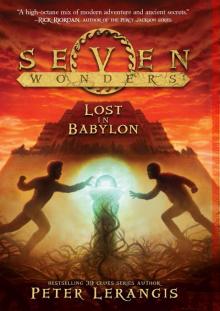 Lost in Babylon
Lost in Babylon Last Stop
Last Stop Antarctica Escape from Disaster
Antarctica Escape from Disaster Rewind
Rewind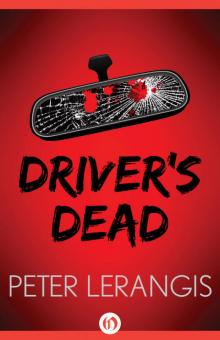 Driver's Dead
Driver's Dead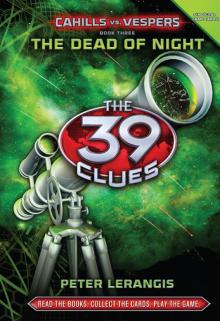 The Dead of Night
The Dead of Night The Promise
The Promise The Yearbook
The Yearbook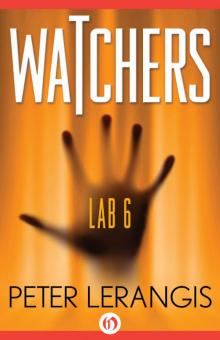 Lab 6
Lab 6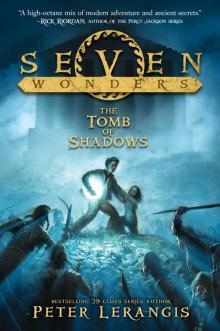 The Tomb of Shadows
The Tomb of Shadows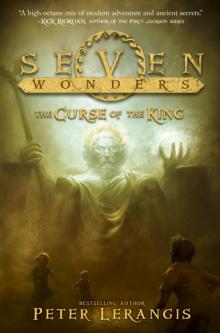 The Curse of the King
The Curse of the King Max Tilt: Fire the Depths
Max Tilt: Fire the Depths The Fall Musical
The Fall Musical The Chaos Loop
The Chaos Loop Island
Island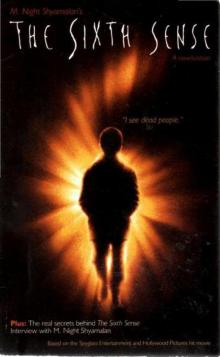 The Sixth Sense
The Sixth Sense Wtf
Wtf War
War Star Trek IV, the Voyage Home
Star Trek IV, the Voyage Home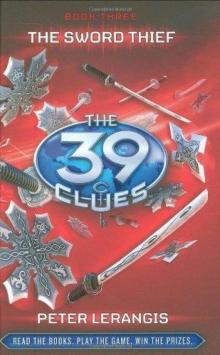 The Sword Thief
The Sword Thief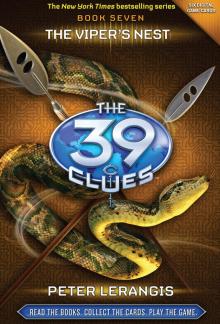 The Viper's Nest
The Viper's Nest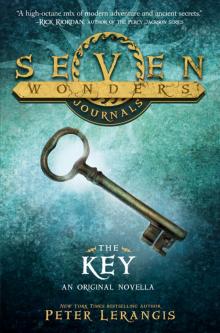 The Select
The Select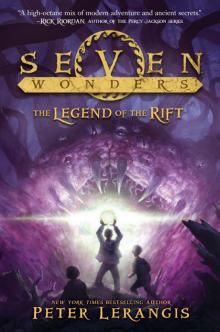 The Legend of the Rift
The Legend of the Rift I.D.
I.D. The Sword Thief - 39 Clues 03
The Sword Thief - 39 Clues 03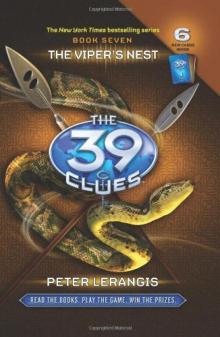 The 39 Clues Book 7: The Viper's Nest
The 39 Clues Book 7: The Viper's Nest Antarctica
Antarctica Seven Wonders Journals: The Select
Seven Wonders Journals: The Select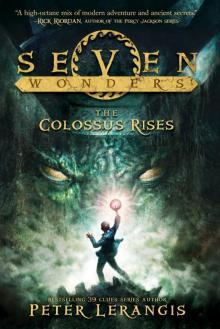 Seven Wonders Book 1: The Colossus Rises
Seven Wonders Book 1: The Colossus Rises Enter the Core
Enter the Core![39 Clues _ Cahills vs. Vespers [03] The Dead of Night Read online](http://i1.bookreadfree.com/i1/04/02/39_clues_cahills_vs_vespers_03_the_dead_of_night_preview.jpg) 39 Clues _ Cahills vs. Vespers [03] The Dead of Night
39 Clues _ Cahills vs. Vespers [03] The Dead of Night Fire the Depths
Fire the Depths 80 Days or Die
80 Days or Die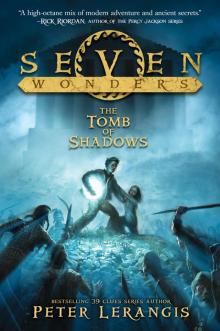 Seven Wonders Book 3
Seven Wonders Book 3